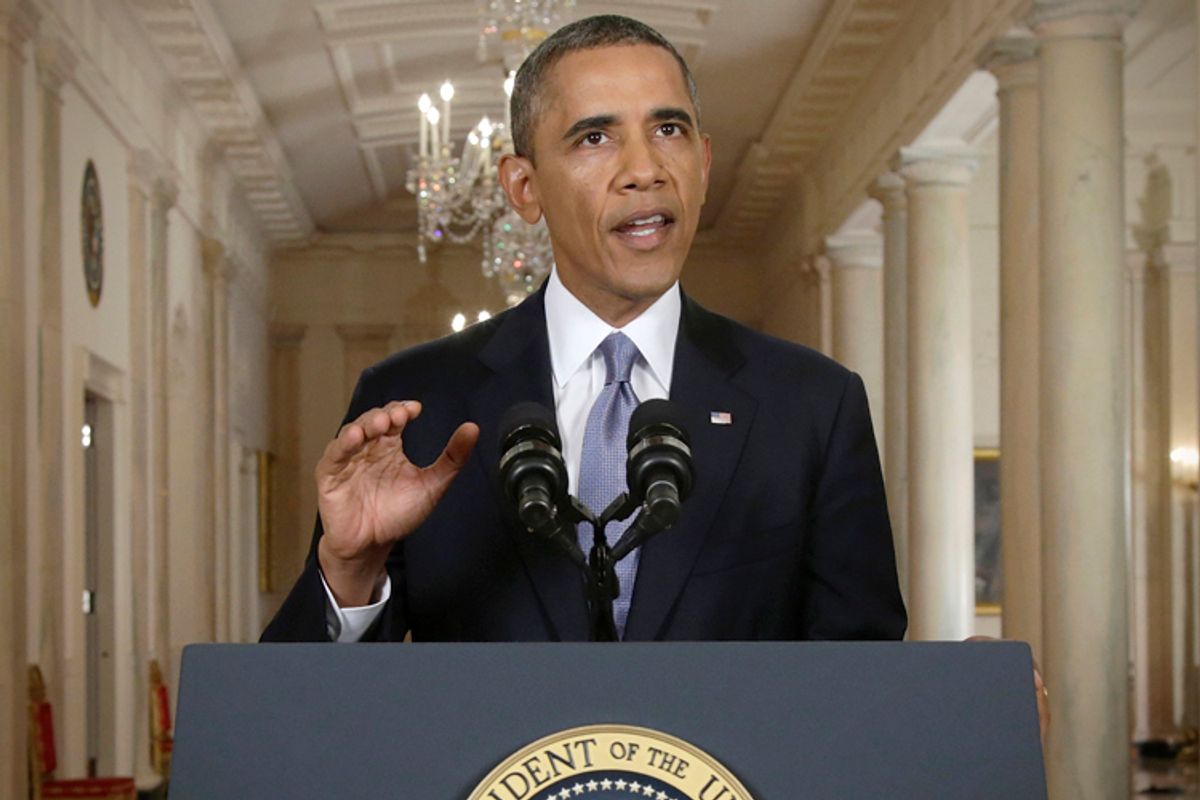People who look for simple answers – and I admit that includes me sometimes – are flummoxed by the turn of events that led President Obama down the East Room corridor Tuesday night, to declare that Congress ought to delay its vote to authorize the use of force against Syria, for now.
Obama first laid out the moral and national security case for a military strike to punish Bashar Assad for using chemical weapons against his people. “This is not a world we should accept,” he said. But a speech that seemed mostly written before a Russian attempt to get Assad to give up his stockpile then veered into a defense of diplomacy. “I’m sending Secretary of State John Kerry to meet his Russian counterpart on Thursday, and I will continue my own discussions with President Putin,” Obama promised, in a strangely lackluster address that essentially served as a placeholder for a theoretical future battle.
For so many pundits, it seems, the surprise Russian diplomacy that postponed the president’s planned use of force has to be explained by one thing or the other – it was either Obama’s threat of force, or else citizen antiwar outrage; the president’s brilliant 11thdimensional chess diplomacy (to die-hard Obama zealots) or his typical Keystone Kops bungling (to Obama haters). We won’t know the truth for many years, but whatever the cause, the pause in the momentum toward a military conflict is welcome.
Personally I think one of the most important factors in the surprising events of the last few days was the president going to Congress. Since antiwar public opinion forced the president to do that, I give a lot of credit to antiwar public opinion. And since it was the president who decided to go to Congress, when he believes he didn’t have to, I give him credit, too. I guess it’s clear I think the search for credit and blame is useless right now, as well as divisive.
Eerily, on the 12th anniversary of the Sept. 11 attacks, people who argued about the Syria nightmare in good faith can all declare victory, for now. Those of us who insisted that the U.S. should exhaust all diplomatic possibilities before military action were right – and now we’re going to have a chance to see where diplomacy can go. Conventional wisdom said the U.N. Security Council was a dead end given Russia’s veto power -- but now both the Security Council and Russia are engaged.
Certainly U.S. and global opposition to military intervention in Syria helped get us here, but I can’t say Obama’s promise to use force didn’t play a role as well. In the last few days Syria has not only admitted to possessing weapons for the first time, but Assad is promising to join the international Chemical Weapons Convention. I don’t have any reason to believe either thing would have happened, this week, without the threat of force.
People who argued on either side in bad faith, however, are out of luck. Senate Minority Leader Mitch McConnell looks the worst right now, having stayed on the sidelines of this debate until it was clear military action wasn’t imminent, and then declaring, unbelievably, that he opposed a Syria strike. Everyone knows McConnell would be gung-ho behind a strike against Syria but for two problems: a Tea Party primary challenger named Matt Bevin and a president named Barack Obama.
McConnell’s Kentucky Senate colleague, Rand Paul, meanwhile, has been a consistent foe of military intervention, and I’ve publicly given him credit for that consistency. But Paul humiliated himself too on Tuesday, with his “response” to the president’s speech that was actually pre-taped, so it couldn’t reflect the fact that Obama didn’t ask for authorization to use military force after all. Just when you think you can give a Tea Partyer credit for integrity, you get disappointed.
The pause in the charge to war is welcome, even if the charge to diplomacy has its own problems. The Russians are reportedly blocking a Security Council resolution proposed by the French; post-speech cable news analysis made a lot of this, as though a military strike would be a cakewalk, in the words of GOP hawks in 2003. Of course there are plenty of obstacles to a negotiated settlement – including the Syrian rebels. Let’s remember they were the ones who rejected talks with Assad proposed by Kerry and his Russian counterpart in July. This is a mess.
But at least for now, diplomacy won, and whatever it took, it’s a surprising and welcome development. Though Obama still insists the U.S. will stand up to Syria to enforce international sanctions against chemical weapons, a unilateral strike against Syria would itself violate international law. With the ongoing unexpected engagement of Russia, we have a chance at assembling an international coalition to enforce international law. It’s a sobering place to be on another Sept. 11.



Shares